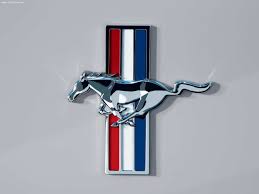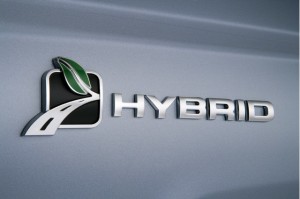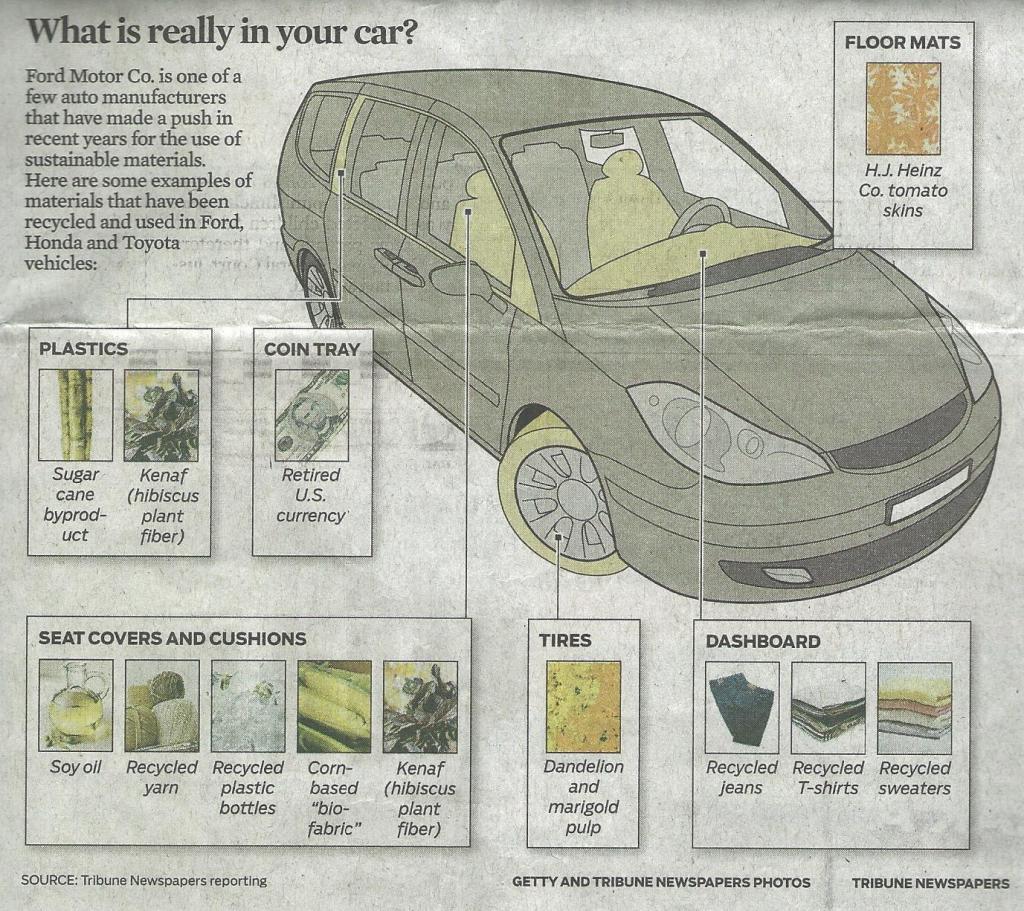Ford. Galloping for Green!

 Some who know me know why I have an affinity for FoMoCo. For one, I grew up in Motown. I even knew a Ford or two, including a racy Cougar.
Some who know me know why I have an affinity for FoMoCo. For one, I grew up in Motown. I even knew a Ford or two, including a racy Cougar.
So, the Baltimore Sun picked up a piece about Ford originally printed in the LA Times. Under a title better to my liking in the Sun, “Ford greenlights recycling,” the accompanying illustration called “What is really in your car?” (below) was hard to miss. I’ve been waiting to tell you about the car company and a couple of its rivals. Recycled materials coming to your favorite ride!
 Who knew Ford is a member of a consortium called the Plant PET Technology Collective. Calling itself a strategic working group, the aim is “accelerating the development and use of 100% plant-based PET materials and fiber in their products. PET, also known as polyethylene terephthalate, is a durable, lightweight plastic that is used by all member companies in a variety of products and materials including plastic bottles, apparel, footwear and automotive fabric and carpet.” The others in the consortium are Coca-Cola, Proctor & Gamble, Nike and Heinz. The originator of this consortium, formed in 2012, is Coke. It’s developed a plastic bottle that has a lesser environmental impact than the typical PET plastic bottle. Coke licenses its technology to Heinz which is making a more environmentally friendly plastic ketchup bottle as a result! One of the goals is to develop PET plastic products that are 100% plant-based rather than just some percentage of.
Who knew Ford is a member of a consortium called the Plant PET Technology Collective. Calling itself a strategic working group, the aim is “accelerating the development and use of 100% plant-based PET materials and fiber in their products. PET, also known as polyethylene terephthalate, is a durable, lightweight plastic that is used by all member companies in a variety of products and materials including plastic bottles, apparel, footwear and automotive fabric and carpet.” The others in the consortium are Coca-Cola, Proctor & Gamble, Nike and Heinz. The originator of this consortium, formed in 2012, is Coke. It’s developed a plastic bottle that has a lesser environmental impact than the typical PET plastic bottle. Coke licenses its technology to Heinz which is making a more environmentally friendly plastic ketchup bottle as a result! One of the goals is to develop PET plastic products that are 100% plant-based rather than just some percentage of.
The Baltimore Sun article, with its way-cool illustration, describes what parts of a car are being considered for sustainable materials, i.e., floor mats from tomato skins, coin trays from retired U.S. currency and dashboards from recycled jeans/sweaters/tees. With the coin trays, you can actually “see” the shredded currency. Far out, man!
Here’s something else I didn’t know. About company founder Henry Ford. In his early cars he used wheat straw in the steering wheels and hemp fibers to produce car parts. So, comin’ back at you, Mr. Ford.
Another anecdote from the article. Mr. Ford was enough taken with soybeans (remember the farm boy in him) that he once had a suit made from soybean wool. Problem was it couldn’t be cleaned. So, it wasn’t.
As it stands, Ford claims its use of soybean-based plastic saves petroleum consumption the equivalent of 5 M #s/yr.
Honda is in the same playing field. Its Accord Plug-In and Fit EV both have corn-based “biofabric” for seat material. Sounds kinda earthy to me. Or, how to reconnect with the land. (Harvesting corn from a tractor, maybe?) Toyota is another.
BTW, Ford is now looking at all its manufacturing and operations through the lens of life cycle assessments, particularly in terms of environmental costs and other adverse product impacts. Very important. Royal Dutch Shell’s on it, as described two posts ago.
